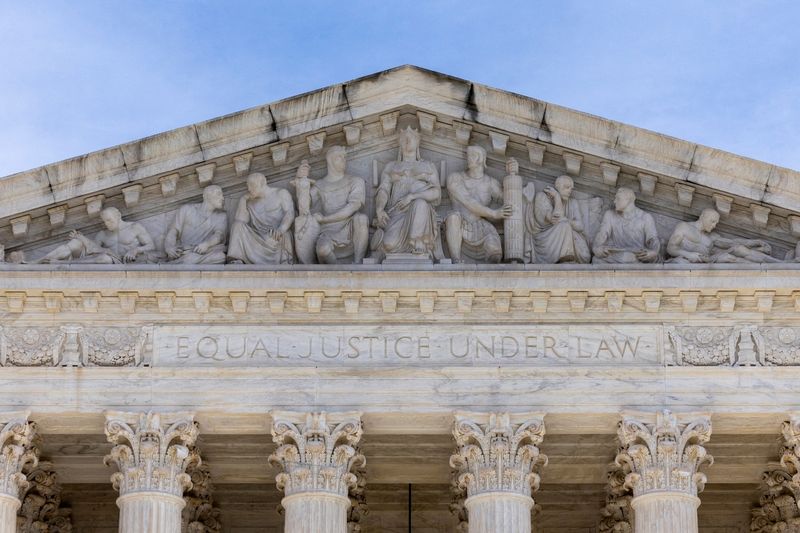By John Kruzel and Andrew Chung
WASHINGTON (Reuters) -U.S. Supreme Court justices on Monday expressed reservations about Republican-backed laws in Florida and Texas meant to restrict the power of social media companies to curb content that the platforms deem objectionable, but signaled they may not be ready to block them in their entirety.
During nearly four hours of arguments in the cases, the justices expressed concern that the laws could undermine the editorial discretion of the platforms in violation of free speech protections. But they also indicated they might permit the laws to regulate certain non-expressive internet services such as the provision of email, direct messaging or car-sharing.
The laws were challenged by tech industry trade groups NetChoice and the Computer & Communications Industry Association, whose members include Facebook (NASDAQ:META) parent Meta, Alphabet (NASDAQ:GOOGL)'s Google, which owns YouTube, as well as TikTok and Snapchat owner Snap. Neither law has taken effect.
At issue was whether state laws regulating content-moderation practices by large social media platforms - born of Republican concerns about alleged bias against conservative voices - violate free speech rights for the companies under the U.S. Constitution's First Amendment.
Conservative Chief Justice John Roberts asked Henry Whitaker, Florida's solicitor general, "whether our first concern should be with the state regulating what, you know, we have called the modern public square." Whitaker said Florida is seeking to regulate conduct, not speech.
Conservative Justice Brett Kavanaugh noted that prior Supreme Court rulings "emphasize editorial control as being fundamentally protected by the First Amendment."
The cases give the justices an opportunity to decide whether the First Amendment protects the editorial discretion of the social media platforms and prohibits governments from forcing companies to publish content against their will.
The companies have said that without such discretion - including the ability to block or remove content or users, prioritize certain posts over others, or include additional context - their websites would be overrun with spam, bullying, extremism and hate speech.
Liberal Justice Elena Kagan, referring to Florida's measure, said the justices might not want to "allow this law to go into effect because of the unconstitutional applications." But Kagan added that blocking it entirely might also be a problem if "we can assume that this statute covers a variety of things that are Gmail-like, direct messaging, and Uber (NYSE:UBER), and things that are not creating speech products."
Conservative Justice Amy Coney Barrett said such concerns were heightened by the fact that lower courts did not get a chance yet to fully flesh out the cases before they reached the Supreme Court.
"I mean, we don't have a lot of briefing on this, and this is a sprawling statute - and it makes me a little bit nervous," Barrett told Paul Clement, an attorney representing NetChoice.
Rulings allowing the laws to stand could lead to a patchwork of state measures governing content moderation, raising the complexity and cost of compliance for platforms.
President Joe Biden's administration, which opposes the laws, has argued that the content-moderation restrictions violate the First Amendment by forcing platforms to present and promote content they view as objectionable.
Conservative Justice Samuel Alito, in one sharp exchange, pressed U.S. Solicitor General Elizabeth Prelogar on whether the term "content moderation" was a euphemism for censorship, echoing a concern expressed by officials from Florida and Texas and conservative commentators.
The Supreme Court has a 6-3 conservative majority.
'A NON-STARTER'
Clement told the justices that the platforms seek to promote open dialogue, adding that, contrary to the states' claims, "conservative voices have really flourished on those websites." Clement said that upholding the laws would be dangerous for young people - whose social media use is being increasingly scrutinized as harmful - because protective measures might be undermined.
"If we have suicide prevention, we have to have suicide promotion to avoid viewpoint discrimination. That should be a non-starter," Clement said.
Florida's law requires large platforms to "host some speech that they might otherwise prefer not to host" by prohibiting the censorship or banning of a political candidate or "journalistic enterprise."
The Texas law forbids social media companies with at least 50 million monthly active users from acting to "censor" users based on "viewpoint," and allows either users or the Texas attorney general to sue to enforce it.
Florida is seeking to revive its law after the Atlanta-based 11th U.S. Circuit Court of Appeals ruled largely against it. The industry groups are appealing a decision by the New Orleans-based 5th U.S. Circuit Court of Appeals upholding the Texas law.
The Supreme Court's ruling is expected by the end of June.

A decision upholding the laws could take a toll on social media companies' ability to attract advertiser dollars, said Debra Aho Williamson, a long-time analyst of Facebook-owner Meta.
"Going into the 2024 election, U.S. advertisers are very concerned about brand safety in social media. The majority of them don't want their brands associated with negative or inflammatory content," Williamson said.